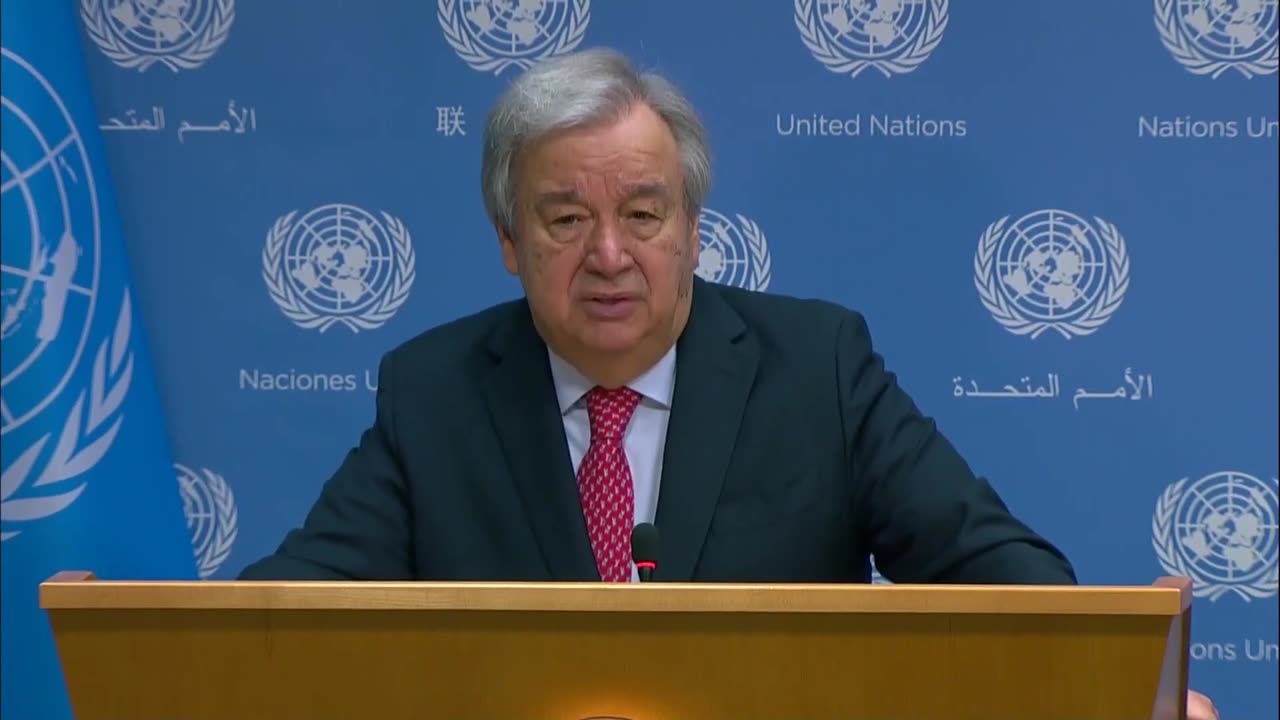Premium Only Content

Taking on Record Temperatures: UN Chief's Call to Action
As July 2023 is set to be the hottest month ever recorded, UN Secretary-General António Guterres said that humanity is in the hot seat, urging that “leaders must lead” with dramatic, immediate climate action to limit global temperature rise to 1.5 degrees Celsius.
According to the data released today, July has already seen the hottest three-week period ever recorded, the three hottest days on record, and the highest-ever ocean temperatures for this time of year.
Speaking to reporters today (27 Jul) in New York, Guterres said that the consequences are clear and they are tragic: children swept away by monsoon rains, families running from the flames, workers collapsing in the scorching heat.
Guterres reiterated, “Climate change is here. It is terrifying. And it is just the beginning.”
He warned, “The era of global warming has ended; the era of global boiling has arrived,” adding that “the air is unbreathable. The heat is unbearable. And the level of fossil fuel profits and climate inaction is unacceptable.”
The UN chief emphasized, “Leaders must lead. No more hesitancy. No more excuses. No more waiting for others to move first.”
“There is simply no more time for that. It is still possible to limit global temperature rise to 1.5 degrees Celsius and avoid the very worst of climate change. But only with dramatic, immediate climate action,” Guterres said.
The Secretary-General reiterated that accelerating temperatures demand accelerated action and added that there are several critical opportunities ahead, namely the Africa Climate Summit, the G20 Summit, and the UN Climate Ambition Summit.
"Leaders – and particularly G20 countries responsible for 80 percent of global emissions – must step up for climate action and justice," Guterres added.
He explained, “We need ambitious new national emissions reduction targets from G20 members. And we need all countries to take action in line with my Climate Solidarity Pact and Acceleration Agenda: Hitting fast forward so that developed countries commit to reaching net zero emissions as close as possible to 2040 and emerging economies as close as possible to 2050, with support from developed countries to do so.”
The UN chief continued, “All actors must come together to accelerate a just and equitable transition from fossil fuels to renewables -- as we stop oil and gas expansion and funding and licensing for new coal, oil, and gas.”
He said, “Financial institutions must end their fossil fuel lending, underwriting, and investments and shift to renewables instead. And fossil fuel companies must chart their move towards clean energy, with detailed transition plans across the entire value chain.”
Guterres reiterated, “No more greenwashing. No more deception. And no more abusive distortion of anti-trust laws to sabotage net zero alliances.”
On adaptation, the UN chief said that as extreme weather is becoming the new normal, all countries must respond and protect their people from the searing heat, fatal floods, storms, droughts, and raging fires that result.
He said, “It is time for a global surge in adaptation investment to save millions of lives from climate carnage.”
The UN chief continued, “That requires unprecedented coordination around the priorities and plans of vulnerable developing countries. Developed countries must present a clear and credible roadmap to double adaptation finance by 2025 as a first step towards devoting at least half of all climate finance to adaptation.”
He added, “Every person on earth must be covered by an early warning system by 2027 – by implementing the Action Plan we launched last year. And countries should consider a set of global goals to mobilize international action and support on adaptation.”
On climate finance, Guterres said that promises made on international climate finance must be promises kept. Developed countries must honor their commitments to provide $100 billion a year to developing countries for climate support and fully replenish the Green Climate Fund.
He further expressed concern as only two G7 countries – Canada and Germany – have made replenishment pledges. Guterres concluded, “We need a course correction in the global financial system so that it supports accelerated climate action. That includes putting a price on carbon and pushing the multilateral development banks to overhaul their business models and approaches to risk.”
He added, “We need the multilateral development banks leveraging their funds to mobilize much more private finance at reasonable cost to developing countries -- and scaling up their funding to renewables, adaptation and loss and damage.”
-
 LIVE
LIVE
Nikko Ortiz
36 minutes agoBattlefield 6 We Blastin... |Rumble Live
112 watching -
 LIVE
LIVE
Red Pill News
2 hours agoBolton Grand Jury Reviewing Evidence NOW on Red Pill News Live
3,912 watching -
 LIVE
LIVE
Wayne Allyn Root | WAR Zone
6 hours agoWatch LIVE: The War Zone Podcast with Wayne Allyn Root
38 watching -
 1:23:55
1:23:55
Benny Johnson
3 hours ago🚨Trump LIVE Right Now at Emergency Press Conference with FBI Director Kash Patel in Oval Office
42.8K45 -
 3:22:05
3:22:05
Right Side Broadcasting Network
9 hours agoLIVE: President Trump Hosts a Press Conference with FBI Director Kash Patel - 10/15/25
119K18 -
 44:24
44:24
Clownfish TV
5 hours agoCNN is Angry 'The Male Gaze' Returned! TRADWIVES and SYDNEY SWEENEY are Blamed?! | Clownfish TV
17.7K15 -
 LIVE
LIVE
LFA TV
21 hours agoLIVE & BREAKING NEWS! | WEDNESDAY 10/15/25
1,022 watching -
 LIVE
LIVE
freecastle
6 hours agoTAKE UP YOUR CROSS- CONTEND earnestly for the FAITH once for all entrusted to the Saints!
96 watching -
 1:09:38
1:09:38
vivafrei
3 hours agoLiquid Death-Gate! Text Message-Gate! Ostrich-Gate! AN
73.1K41 -
 1:19:39
1:19:39
The HotSeat
3 hours agoAmericans Are Turning Back to God — While Terror Rises Again in Gaza
15.2K1